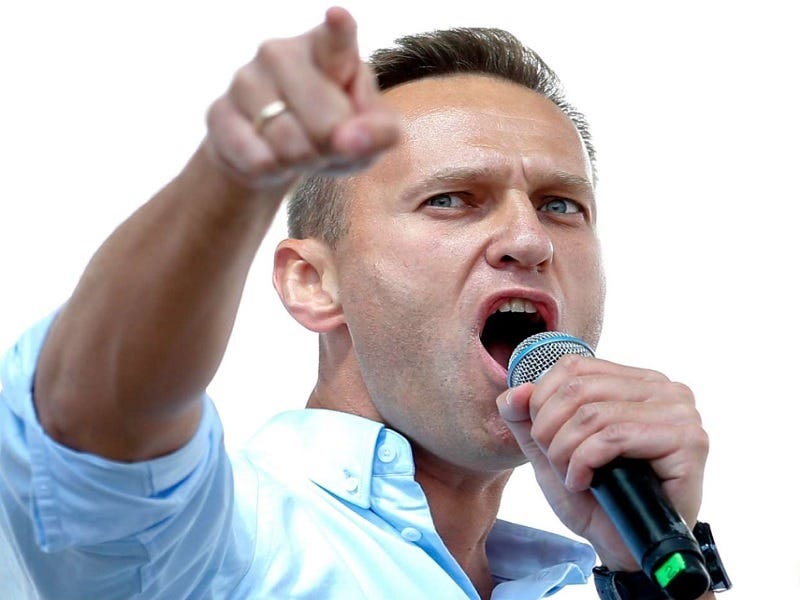Putin Had No Reason To Kill Navalny But The West Has Every Reason To Lie That He Did
The timing couldn’t have been worse from the perspective of Russian state interests.
The death of Alexey Navalny in an Arctic prison on Friday, which was tentatively attributed to a blood clot, has sparked another global round of anti-Russian information warfare. Western officials claimed within minutes of the news breaking that President Putin was responsible for his passing, but he had no reason to kill him while the West has every reason to lie that he did. The present piece will present a few arguments in support of these interconnected theses.
The timing couldn’t have been worse from the perspective of Russian state interests. Presidential elections will be held in a month and the incumbent would prefer as high of a turnout as possible, yet now some misled members of the electorate who wouldn’t ordinarily boycott the vote might sit this one out in protest. The West will predictably spin whatever reduced turnout might result from this as delegitimizing President Putin’s mandate when he wins another term as expected.
Furthermore, the unauthorized demonstrations that have taken place in some Russian cities to mourn Navalny prompted law enforcement to detain some of the participants, which the West will exploit in pursuit of the abovementioned goals. Neither outcome will lead to any serious unrest or disrupt the political process inside of Russia, but their importance rests in how much they might continue kindling anti-Russian information warfare operations inside the West itself.
Therein lies the immediate significance of their lies since they’re aimed at generating more support for lagging financial and miliary aid to Ukraine. There’s no connection between Navalny’s death and that conflict, but the narrative is already being spewed that approving more aid is supposedly the best way to spite President Putin. It’s also fortuitous from the West’s perspective that he died while their elite are in Munich right now for this year’s security conference since they can now easily coordinate these plans.
These arguments cogently explain why President Putin had no reason to kill Navalny, not least of which is because this alleged American agent was already imprisoned and therefore no longer posed a national security threat, but why the West has every reason to lie that he did. About the latter’s reaction to events, it’s clearly hypocritical since they didn’t say a peep when Gonzalo Lira died in a Ukrainian prison earlier last month after being arrested on dubious charges related to his video blogging.
Moreover, Navalny’s embrace of Islamophobic, ultra-nationalist, and xenophobic views at one point in his career would have led to him being “canceled” if he was a Western politician according to that civilization’s modern “politically correct” standards, so it’s ironic that he’s being lionized by them. The only reason why they’re doing so is for domestic and foreign information warfare purposes related to emboldening extremist elements and delegitimizing President Putin in the world’s eyes respectively.
That’s always been the role that he was tapped to play in the larger scheme of things, especially after his mysterious poisoning in summer 2020. It was argued at the time that “It’s Unrealistic to Speculate That the Kremlin Wanted to Kill Navalny” for similar reasons as were shared in the present piece, several months after which an answer was provided to the question of “Why’d Navalny Return to the Same Country That He Claimed Tried to Kill Him?” In short, he was tasked with becoming a “political martyr”.
“Navalny Was A NATO Agent, But Not All Unauthorized Protesters Are Foreign Proxies”, neither back then nor now. Nevertheless, his return to the country to face corruption charges and the steep prison sentence that he knew awaited him was always meant to serve as a means for emboldening extremist elements and delegitimizing President Putin, hence why his handlers ordered him to do so. He could have theoretically declined, but he was either too compromised or radicalized to do so.
In any case, the point in refreshing readers’ memories about this is to emphasize that Russia could have simply kept him inside the country after summer 2020’s mysterious poisoning incident and ensured that he died in the hospital, with there being no reason to send him to Germany if they really wanted him dead. This observation reinforces the suspicions among many non-Westerners at the time that whatever happened wasn’t a botched assassination attempt like the West claimed but a foreign provocation.
At the end of the day, while there’ll naturally be questions about the timing of his demise, there shouldn’t be any doubt that President Putin had no reason to kill Navalny while the West has every reason to lie that he did. If anything, the timing is so disadvantageous from the perspective of Russian state interests that folks can be forgiven for speculating without any evidence at this point at least that a foreign hand was involved, but the investigation will clarify what exactly happened once it finally ends.



